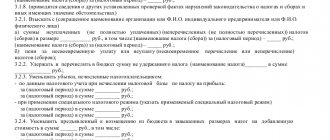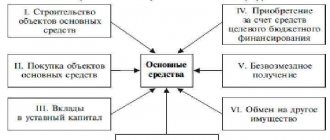What offenses are considered under Art. 101 of the Tax Code of the Russian Federation?
Let's look at what kind of offenses can be recorded by the heads of the Federal Tax Service or their deputies in accordance with Art. 101 Tax Code of the Russian Federation.
The resolution of the Plenum of the Supreme Arbitration Court of the Russian Federation dated July 30, 2013 No. 57 states that in the manner provided for by the provisions of Art. 101 of the Tax Code of the Russian Federation, offenses are considered, the composition of which is defined:
- Art. 120 of the Tax Code of the Russian Federation (gross violation of the rules for accounting for income and expenses);
- Art. 122 of the Tax Code of the Russian Federation (non-payment of a tax or fee or its incomplete transfer to the budget);
- Art. 123 of the Tax Code of the Russian Federation (failure by the agent to fulfill obligations to transfer taxes to the budget).
About what types of violations are considered to fall under Art. 123 of the Tax Code of the Russian Federation, read the material “The Ministry of Finance recalled the conditions for a fine under Art. 123 Tax Code of the Russian Federation" .
In turn, offenses, the composition of which is determined in other articles of the Tax Code of the Russian Federation, should be considered, as the Supreme Arbitration Court of the Russian Federation believes, in accordance with Art. 101.4 Tax Code of the Russian Federation.
Gross violations by a company of the procedure for accounting for income and expenses may be accompanied by a fine of 10,000 rubles if they are committed within the same tax period. If a company commits a similar violation in subsequent tax periods, the amount of sanctions is tripled. If a gross violation of the procedure for accounting for income and expenses led to a decrease in the tax base (contribution base), then the company will pay a fine in the amount of 20% of the unpaid tax (contributions), but not less than 40,000 rubles.
Gross violations in the provisions of the Tax Code of the Russian Federation mean:
- the company lacks primary documents;
- lack of invoices;
- lack of accounting or tax registers;
- incorrect or untimely reflection on synthetic, analytical accounting accounts, as well as in tax registers of business operations, assets, and financial resources.
Read more about penalties for this type of violation in the article “Fine for gross violation of the rules for accounting for income and expenses .
Let us note that from April 2021, liability for taxpayer officials has been tightened for gross violations in accounting (Article 15.11 of the Code of Administrative Offenses). Now the fine for them can be 5,000 rubles. – 10,000 rub. against 2,000 rub. — 3,000 rub. according to previous standards. In addition, the legislator expanded the list of violations that entail administrative liability.
Failure to pay a tax or fee or their incomplete transfer to the budget is accompanied by a fine of 20% of the corresponding debt of the company. If it is established that the taxpayer knowingly refused to pay taxes and fees, the fine may amount to 40% of the debt to the budget.
If the tax agent does not fulfill its obligations to withhold and transfer the required amounts to the Russian budget or does not fulfill them in full, then it will have to pay a fine in the amount of 20% of the amount of money that must be transferred to the state.
At the same time, decisions of officials from the Federal Tax Service, made based on the results of reviewing documents as part of inspections and reflecting the agency’s position on establishing facts of offenses, can be appealed. Let's consider this aspect in more detail.
In what cases does the Federal Tax Service have the right not to satisfy a taxpayer’s complaint?
It will be useful to consider the norms of the Tax Code of the Russian Federation, according to which the Federal Tax Service acquires the right to refuse to satisfy a payer’s complaint. First of all, we note that this action is among 5 possible ones that tax authorities have the right to carry out. Apart from the refusal to satisfy the complaint, these include:
- cancellation of the act of a lower tax authority;
- reversal of the decision of a lower tax authority (in whole or in part);
- cancellation of the decision of the lower structure of the Federal Tax Service and adoption of a new one
- recognizing the actions (inaction) of tax officials as illegal and making a decision on the merits.
Provisions of paragraph 1 of Art. 139.3 of the Tax Code of the Russian Federation includes the grounds on which the Federal Tax Service has the right to refuse a payer’s complaint. A similar scenario is possible if:
- the procedure for filing a complaint is not followed or it does not indicate acts of the tax authority of a non-regulatory nature, actions or inactions of its officials that led to a violation of rights;
- the deadline for filing a complaint has been missed, there is no request for its restoration, or the payer has been denied this right;
- the applicant, before the Federal Tax Service made a decision on the complaint, sent the department a recall of the document - in whole or in part;
- this is not the first time a complaint has been filed with the Federal Tax Service, but on the same grounds as the previous one;
- Before making a decision on the complaint, the tax authority reported that the violation of the taxpayer’s rights had been eliminated.
At the same time, the taxpayer can try to challenge the refusal to satisfy the complaint, as well as file the complaint again, if the reason for the refusal was not a withdrawal of the complaint or a repetition.
Is it possible to send clarification during the inspection?
As we noted above, among the offenses that can be recorded under Art. Tax Code 101 - non-payment of taxes, fees or incomplete transfer to the budget (Article 122 of the Tax Code of the Russian Federation). The amount of these obligations is fixed mainly based on the information in the tax return provided by the company to the Federal Tax Service.
It may happen that the accounting department of the audited organization discovers that the already submitted declaration contains errors, as a result of which discrepancies arise between the actual tax obligations and the declared ones not in favor of the taxpayer. The Federal Tax Service, having discovered them during an inspection, can record an offense. Many companies, upon detection of relevant errors, immediately send an updated declaration to the Federal Tax Service. But is it possible to do this directly during the inspection?
Taxpayers are required to send clarifications to the tax authorities if errors in the previous declaration led to a reduction in tax (clause 1 of Article 81 of the Tax Code of the Russian Federation). In turn, the norms of the Tax Code of the Russian Federation do not establish circumstances and criteria limiting the sending of updated declarations to the Federal Tax Service.
Thus, it is quite acceptable to send clarifications to tax authorities during audits. However, will this help to avoid a decent fine upon discovery of arrears by the Federal Tax Service - 20% of the unpaid tax (clause 1, Article 122 of the Tax Code of the Russian Federation), and if inspectors consider the incorrect calculation of tax by the company to be intentional - then 40% (clause 3, Article 122 Tax Code of the Russian Federation)?
Unfortunately, the clarification does not guarantee that the Federal Tax Service will refuse to issue a fine. But you can avoid it if:
- submit the clarification before the deadline for transferring the tax to the budget;
- submit the clarification before being informed that the Federal Tax Service has discovered an error in the main declaration, or that the tax authorities will initiate an on-site audit for the corresponding period, provided that by the time the clarification is submitted the company will have paid the tax and penalties;
- During the on-site inspection, the Federal Tax Service did not reveal any errors in the declaration.
Another option to avoid a fine is to pay taxes and penalties, submit an amendment and send a request to the Federal Tax Service not to charge a fine, based on the provisions of sub-clause. 3 p. 1 art. 112 of the Tax Code of the Russian Federation. That is, by referring to circumstances that could mitigate liability for the identified tax offense.
Providing clarification, paying taxes and penalties, at a minimum, will convince the Federal Tax Service that the payer understated the amount of tax in the main declaration unintentionally, and the likelihood of the department imposing a fine of 40% will be significantly reduced.
To learn how the fine for tax failure to be paid on time will be calculated when several clarifications are submitted for the same period, read the material “How will the fine for non-payment be calculated if several clarifications are submitted in one period?” .
Grounds for canceling a tax authority's decision
The decision does not take effect immediately. The person involved is given a month to appeal the document through the appeal procedure. It is possible to challenge a decision by filing a complaint through the body that made the original decision.
The outcome of the consideration of the complaint may be either its satisfaction or refusal. The application may also be partially granted. In addition, a higher executive body can cancel the decision and make a new one.
Any decision not related to the satisfaction of the complainant’s demands transfers the disputed document to the status of being valid in part or in full.
After an unsuccessful appeal, it is possible to file claims in court. This complaint is sent to the appropriate structure at the location of the body that made the decision. Requirements for the content of statements of claim when filing and acceptable deadlines are contained in the procedural legislation of the Russian Federation.
The reasons for cancellation can be both factual and procedural, due to a gross violation of the rights of the involved person.
Also, the basis for cancellation is a conviction against an individual who was previously brought to tax liability.
What are the legal grounds for the Federal Tax Service to take interim measures?
In accordance with paragraph 10 of Art. 101 of the Tax Code of the Russian Federation, the Federal Tax Service may apply interim measures against the inspected organization aimed at preserving the assets of the payer, through which its obligations to the budget that arose as a result of the inspection can be repaid. It will be useful to consider what are the legal reasons for taking these measures by the Federal Tax Service and in what cases the tax authorities do not have the right to implement them.
The Tax Code of the Russian Federation does not contain provisions regulating in detail the criteria for initiating interim measures, which the Federal Tax Service must adhere to. In paragraph 10 of Art. 101 of the Tax Code of the Russian Federation only states that tax authorities must have sufficient grounds to believe that refusal to take interim measures may adversely affect the execution of the decision of the Federal Tax Service, which requires the company to pay arrears, penalties and fines. What could those “sufficient reasons” be?
Judicial practice shows that such a basis may be, in particular, the actions of the inspected company, expressed in the transfer of fixed assets in favor of the founders, in terms of timing coinciding with the inspection (Resolution of the Federal Antimonopoly Service of the West Siberian District dated January 27, 2012 No. A27-5430/2011) . Tax authorities, having recorded this circumstance, have the right to consider that the company, by reducing assets, seeks to avoid subsequent payment of arrears, and the court may agree with this argument of the Federal Tax Service.
Another possible sufficient reason is the initiation by the company of a liquidation procedure, accompanied by a decrease in the amounts available in current accounts (Resolution of the Federal Antimonopoly Service of the North Caucasus District dated January 21, 2013 No. A53-9359/2012). This reason can be assessed as especially compelling if the liquidated company, in addition to cash in its current account, does not have a significant amount of other property through which the debt to the budget can be repaid.
The active sale of property by a company directly upon receipt of an inspection report from the Federal Tax Service is another possible reason for tax authorities to find sufficient grounds for taking interim measures (Resolution of the Federal Antimonopoly Service of the East Siberian District dated September 4, 2012 No. A10-3116/2011).
Another possible basis for discovering sufficient grounds for the Federal Tax Service to take interim measures against the taxpayer is the implementation by the audited company of settlements with shell companies (Resolution of the Federal Antimonopoly Service of the West Siberian District dated April 10, 2015 No. A70-6490/2014).
One way or another, in most cases, the taxpayer has the right to challenge the decision of the Federal Tax Service to take interim measures in court, since the Tax Code of the Russian Federation does not define in detail the criteria for detecting sufficient grounds for issuing it.
At the same time, the payer also has the opportunity to give the tax authorities a counter-response in the form of their own “interim measures.” Let us consider their essence in more detail.
Interim measures in favor of the taxpayer: what is their essence?
The term “interim measures” in Russian legislation can be interpreted in different ways. Thus, in the Tax Code of the Russian Federation, these are understood as actions of the Federal Tax Service aimed at preserving the taxpayer’s property, against which arrears can be repaid. However, there are also interim measures provided for by the arbitration procedural legislation. In accordance with paragraph 1. Art. 90 of the Arbitration Procedure Code of the Russian Federation, these should be understood as measures that are aimed at ensuring the property interests of the subject.
The main interim measures (in the meaning given in the Arbitration Procedure Code of the Russian Federation) in this case may be:
- prohibition of the Federal Tax Service from performing actions with property and bank accounts that are actually the subject of a dispute (subclause 2, clause 1, article 91 of the Arbitration Procedure Code of the Russian Federation);
- suspension of the decision of the Federal Tax Service on the adoption of interim measures in the meaning given in the Tax Code of the Russian Federation (clause 3 of Article 199 of the Arbitration Procedure Code of the Russian Federation).
As we noted above, recourse to arbitration is possible only after the taxpayer has carried out the necessary interactions with the Federal Tax Service in a pre-trial manner. But, if a company legally initiated a claim in arbitration, the subject of which is the adoption of interim measures (in the meaning given in the Arbitration Procedure Code of the Russian Federation), then the Federal Tax Service, while the case is being considered in court, cannot apply its own interim measures in the meaning given in the Tax Code RF (clause 77 of the resolution of the Supreme Arbitration Court of the Russian Federation dated July 30, 2013 No. 57).
Sources:
- Tax Code of the Russian Federation
- Arbitration Procedural Code of the Russian Federation
You can find more complete information on the topic in ConsultantPlus. Free trial access to the system for 2 days.
How should the Federal Tax Service notify the payer about the consideration of documents?
So, the Tax Code of the Russian Federation regulates in some detail how the Federal Tax Service should send requests to payers to provide additional documents. However, this legal regulation does not regulate in detail how the Federal Tax Service should notify the taxpayer about the time and place of studying documents as part of the audit - that is, fulfill the obligation provided for in paragraph 2 of Art. 101 Tax Code of the Russian Federation.
The Supreme Arbitration Court of the Russian Federation, in Resolution No. 57 dated July 30, 2013, indicates that tax authorities can provide notification of the consideration of documents as part of an audit in any way. The arbitration believes that the Tax Code of the Russian Federation does not have provisions regulating the specific method of communication between the Federal Tax Service and the companies being inspected in this case.
It is important that one or another notification method allows identifying the sender and recipient of information about the consideration of documents. Also, the Federal Tax Service must have evidence of the transfer of relevant information (resolutions of the Presidium of the Supreme Arbitration Court of the Russian Federation dated February 25, 2010 No. 14458/09, dated February 12, 2008 No. 12566/07).
What consequences are provided by law if the taxpayer is not given an on-site inspection report? The answer to this question is in ConsultantPlus. If you don't have access to the system, get a free trial online.
For more information about providing documents to the Federal Tax Service, read the article “How to submit documents at the request of the tax inspectorate .
Can a taxpayer refuse to participate in the review of documents?
One of the pressing issues in the area of interaction between taxpayers and the Federal Tax Service under consideration is whether the former can refuse to participate in the study of documents as part of tax audits. In accordance with paragraph 2 of Art. 101 of the Tax Code of the Russian Federation, the absence of representatives of the inspected organization when considering the inspection materials cannot be an obstacle to carrying out the relevant event, but only if the head of the Federal Tax Service does not consider that their participation is mandatory. Thus, the representative has the right not to interact with the Federal Tax Service during the study of documents, but department officials may consider that this procedure cannot be carried out without his participation.
At the same time, the Federal Tax Service has at its disposal a very effective countermeasure in case the payer’s participation in the review of documents is highly desirable, but he avoids interacting with the tax authorities. The Ministry of Finance, in paragraph 4 of letter No. AS-4-2/9355 dated May 23, 2013, recommends that territorial tax authorities provide taxpayers with notifications of the date, time, and place of consideration of inspection documents simultaneously with the acts that correspond to these inspections. If the payer does not accept this notification, the inspector may, in accordance with the recommendation of the Federal Tax Service, draw up a protocol on the administrative violation provided for in Art. 19.1.4 Code of Administrative Offenses of the Russian Federation. That is, the taxpayer in this case may be held liable for obstructing the activities of the tax authority. As a result, the company's official and the organization itself may be fined.
In what time frame must documents be provided at the request of the Federal Tax Service?
In accordance with paragraph 1 of Art. 93 of the Tax Code of the Russian Federation, as well as clause 6 of Art. 101 of the Tax Code of the Russian Federation, Federal Tax Service inspectors have the right to request various documents from the company being inspected during the inspection. It will be useful to consider the time frame within which they should be provided.
For any types of audits, including additional ones, the taxpayer must send the required documents to the Federal Tax Service within 10 days from the receipt of the relevant request (clause 3 of Article 93 of the Tax Code of the Russian Federation).
The Federal Tax Service can deliver this request in person (clause 1 of Article 93 of the Tax Code of the Russian Federation), send it through a personal account, via telecommunication channels, or by regular mail (clause 4 of Article 31 of the Tax Code of the Russian Federation). If the request is sent by mail, then the date of its receipt is the 6th working day from the date of sending. If the request is sent through the taxpayer’s personal account, then it is considered received the very next day after sending (paragraph 3, paragraph 4, article 31 of the Tax Code of the Russian Federation).
It can be noted that even if the taxpayer received the request by mail before the expiration of 6 days from the date of sending, then he, one way or another, has the right to count the deadline for providing documents after 6 days (letter of the Ministry of Finance of the Russian Federation dated May 6, 2011 No. 03-02-07 /1-159 ).
If the payer does not provide additional documents for verification, the Federal Tax Service will impose a fine on him in the amount of 200 rubles for each source not provided (clause 1 of Article 126 of the Tax Code of the Russian Federation).
In turn, payers are required to provide the necessary documents upon request if they are at the disposal of the company (letter of the Federal Tax Service of the Russian Federation dated February 20, 2015 No. AS-3-2/636).
What is the procedure for appealing the actions of the Federal Tax Service?
In accordance with paragraph 8 of Art. 101 of the Tax Code of the Russian Federation, tax officials must explain to the taxpayer the procedure for appealing a decision made by the Federal Tax Service based on the results of reviewing documents as part of an audit.
Current legal norms make the corresponding appeal mechanism two-stage: first, the payer must express disagreement with the decision of the Federal Tax Service by contacting a higher structure of the department, and if the reaction of the tax authorities does not suit him or the complaint remains unanswered, he can go to court (clause 2 of article 138 of the Tax Code of the Russian Federation ).
The period for consideration of a complaint by a higher body of the Federal Tax Service is 1 month. The department also has the right to extend it for another 1 month if there is a need to obtain documents from lower-level structures of the Federal Tax Service (Clause 6 of Article 140 of the Tax Code of the Russian Federation).
In accordance with the provisions of paragraph 4 of Art. 198 of the Arbitration Procedure Code of the Russian Federation, applications to arbitration must be submitted no later than 3 months after violations of a citizen’s rights are identified. The following actions of tax authorities are recognized as such:
- the higher structure of the Federal Tax Service made a decision on the complaint that did not suit the applicant, and notified him of this decision;
- The deadline for consideration of the complaint by the department has expired.
An alternative to going to court after a higher structure of the Federal Tax Service has made a decision on a complaint may be to subsequently forward the complaint to the central office of the Federal Tax Service in Moscow. This also needs to be done within 3 months from the moment of familiarization with the decision of the territorial structure of the department, which is superior to the Federal Tax Service Inspectorate that conducted the inspection (clause 2 of Article 139 of the Tax Code of the Russian Federation).
A complaint to the structure of the Federal Tax Service, to which the inspectorate of the Federal Tax Service is subordinate, must be submitted in writing signed by the person directly filing it or his representative. You can also submit it in electronic form via telecommunication channels or through the taxpayer’s personal account (clause 1 of Article 139.2 of the Tax Code of the Russian Federation).
The structure of the complaint must include:
- Full name of the applicant, company address;
- information about the appealed decision of the Federal Tax Service;
- the name of the Federal Tax Service whose actions are being appealed;
- the grounds on which the applicant is appealing the decision of the Federal Tax Service;
- applicant's requirements;
- applicant's contact details;
- documents that support the applicant’s arguments;
- if necessary, documents confirming the authority of the person representing the interests of the applicant and signing the complaint;
- method of obtaining a decision on the complaint (on paper, in electronic form or through the taxpayer’s personal account).
It may be noted that the costs associated with a possible contact with lawyers in order to more competently draw up a complaint to the Federal Tax Service can be included in expenses when calculating income tax (letter of the Ministry of Finance of the Russian Federation dated December 7, 2012 No. 03-03-06/1/644 ).
Read about the latest innovations in the appeal procedure in the material “Innovations in appealing the actions of tax authorities have begun to take effect .







